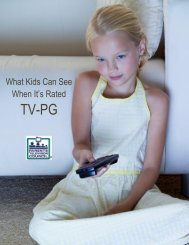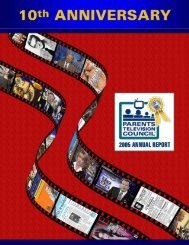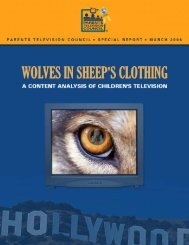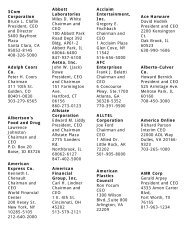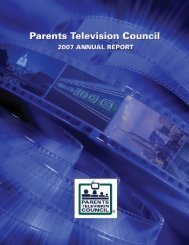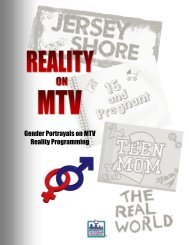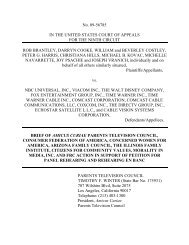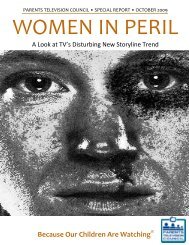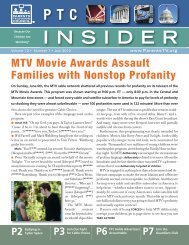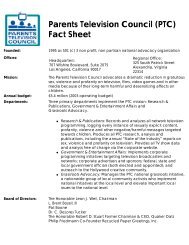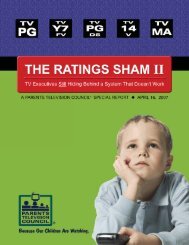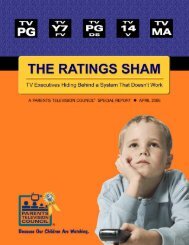Annual Report - Parents Television Council
Annual Report - Parents Television Council
Annual Report - Parents Television Council
Create successful ePaper yourself
Turn your PDF publications into a flip-book with our unique Google optimized e-Paper software.
2006 — The Year In Review<br />
The PTC scored tremendous victories against broadcast,<br />
cable and Internet indecency and violent videogames<br />
in 2006. Making headlines coast-to-coast in<br />
newspapers and on news programs, the PTC battled for<br />
enforcement of broadcast decency laws and led the fight<br />
for true consumer choice in cable programming.<br />
On January 19th PTC President L. Brent Bozell III<br />
went to Capitol Hill to testify before<br />
the Senate Commerce, Science and<br />
Transportation Committee. There,<br />
he demanded that the Senate keep its<br />
promise to increase fines on broadcasters<br />
who play indecent material<br />
on the public airwaves. He also asked<br />
the Senate to reform the current cable<br />
system, which forces subscribers to<br />
subsidize content they find offensive.<br />
To ensure action on the bill,<br />
which the Senate had already delayed for two years, the<br />
PTC joined forces with 28 other national organizations<br />
and coordinated an aggressive phone campaign, flooding<br />
Capitol Hill with tens of thousands of calls. As a result<br />
of Mr. Bozell’s speech and the letters, phone calls and<br />
emails sent by the PTC’s more than one million members,<br />
the Senate unanimously passed the Broadcast Decency<br />
Enforcement Act, which was introduced by PTC<br />
Advisory Board Member<br />
Senator Sam Brownback<br />
(R-Kan). The Act increased<br />
fines for violating<br />
indecency laws to a<br />
maximum of $325,000.<br />
The House passed the bill<br />
by a whopping 379-35<br />
and then a few days later,<br />
President Bush signed<br />
the bill into law. In recognition of the PTC’s leadership<br />
on the issue of broadcast indecency, PTC President L.<br />
Brent Bozell III and Executive Director Tim Winter were<br />
invited guests at the White House signing.<br />
PTC activism also resulted in the Federal Communications<br />
Commission (FCC)<br />
issuing fines totaling nearly<br />
$4 million against broadcasters<br />
for indecent material aired<br />
between February 2002 and<br />
March 2005. One hundred<br />
and eleven CBS affiliates were<br />
fined $3.6 million for re-airing<br />
a program featuring a teen orgy – an episode<br />
about which thousands of FCC complaints had<br />
already been filed. The FCC also upheld fines<br />
against CBS for Janet Jackson’s infamous indecent<br />
exposure during the 2004 Super Bowl.<br />
4<br />
The PTC also launched major campaigns against<br />
foul programming on cable TV. Among the PTC’s targets<br />
were the FX network’s sexually explicit and graphically<br />
violent series The Shield, Rescue Me and Nip/<br />
Tuck; Comedy Central’s raunchy and bigoted cartoon<br />
series South Park and Drawn Together, and its execrable<br />
“roast” of William Shatner; and the constant sex and profanity<br />
aimed at teens by MTV.<br />
The PTC’s efforts to hold advertisers<br />
accountable for their<br />
support of indecent programming<br />
reaped impressive results in 2006.<br />
The PTC mobilized its members to<br />
contact sponsors of foul TV programming.<br />
After the PTC and its<br />
members took action, many advertisers<br />
pulled their support.<br />
Efforts by the networks to circumvent<br />
indecency laws by posting indecent content on<br />
the Internet came under PTC scrutiny. The PTC called<br />
on NBC to explain its decision to post the uncensored<br />
version of an obscenity-laced Saturday Night Live skit<br />
on YouTube and NBC.com, which featured Justin Timberlake<br />
singing a holiday song about a part of the male<br />
anatomy. The skit was bleeped 16 times when it aired on<br />
television. By moving the skit directly to the Internet,<br />
NBC was exploiting a legal loophole to allow objectionable<br />
content that would not meet FCC standards on indecent<br />
programming to reach the public. On YouTube, the<br />
indecent skit was viewed nearly three million times. In<br />
addition, the PTC intensified its efforts to increase public<br />
awareness of the impact of violent video games and their<br />
effects on children, urging the legislators in Oklahoma<br />
and Missouri to approve legislation banning the sale and<br />
rental of violent video games to minors.<br />
The PTC also released its first-ever examination of<br />
children’s television programming in 2006. Wolves in<br />
Sheep’s Clothing found shocking levels of violence on<br />
programs aimed directly at young children. The PTC’s<br />
examination of religious content on TV, Faith in a Box,<br />
pointed out broadcast television’s persistent negative<br />
portrayal of religion. In addition, the PTC released ministudies<br />
on the top 10 shows watched by children aged<br />
2-17 and the 10 Best and Worst Advertisers on TV.<br />
In 2006 the PTC was mentioned thousands of times<br />
in the news media. PTC spokesmen were called upon<br />
hundreds of times to offer expert<br />
advice about relevant issues. That<br />
exposure – “earned media” – multiplies<br />
the reach of donor dollars exponentially.<br />
It is, in effect, tens of<br />
millions of dollars of free publicity<br />
for the PTC.



